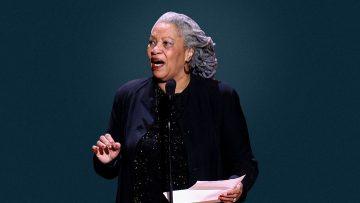Syreeta McFadden in The Atlantic:
 I think a lot about Toni Morrison’s 1993 Nobel Prize lecture. Morrison, who died last week at the age of 88, was one of the nation’s most revered novelists and thinkers, and has left behind an immense opus that has generated renewed interest. Her acceptance speech serves as a prescient reference to the fact that journalists and political leaders today are wrestling with the language necessary to describe the social and political chaos ignited by the Trump administration. It also doubled as a rebuke to detractors flummoxed that Morrison, who wrote inimitable novels about African American life, was being honored with the highest literary prize in the world. In her talk, she invited the audience to engage in an imaginative thought-game, offering a parable of an old blind woman confronted by petulant children. Her speech, though literary and political in nature, outlines the function of language beyond the boundaries of academia and politics.
I think a lot about Toni Morrison’s 1993 Nobel Prize lecture. Morrison, who died last week at the age of 88, was one of the nation’s most revered novelists and thinkers, and has left behind an immense opus that has generated renewed interest. Her acceptance speech serves as a prescient reference to the fact that journalists and political leaders today are wrestling with the language necessary to describe the social and political chaos ignited by the Trump administration. It also doubled as a rebuke to detractors flummoxed that Morrison, who wrote inimitable novels about African American life, was being honored with the highest literary prize in the world. In her talk, she invited the audience to engage in an imaginative thought-game, offering a parable of an old blind woman confronted by petulant children. Her speech, though literary and political in nature, outlines the function of language beyond the boundaries of academia and politics.
The parable begins as such: A group of kids sets out to visit an elderly wise woman, a purported oracle who lives at the edge of town, to prove her powers fraudulent. In Morrison’s retelling, this woman, an American descendant of enslaved black people, attracts these child visitors because “the intelligence of rural prophets is the source of much amusement.” One of the children demands of her: “Old woman, I hold in my hand a bird. Tell me whether it is living or dead.” The old woman, aware of their intent, does not answer, and after a beat she admonishes them for exploiting her blindness—the one difference between them. She tells them that she doesn’t know whether the bird is living or dead, but only that it is in their hands. “Her answer can be taken to mean: If it is dead, you have either found it that way or you have killed it. If it is alive, you can still kill it,” Morrison explained. “Whether it is to stay alive, it is your decision. Whatever the case, it is your responsibility.”
For Morrison, the “bird” was language, and she warned that everyone is culpable for the precarity of language in civil society. “When language dies, out of carelessness, disuse, indifference and absence of esteem, or killed by fiat,” she continued, “not only she herself, but all users and makers are accountable for its demise.” Through this address, Morrison slyly swiped at the national discourse at the time, which focused on how language should be used to define social, cultural, and political realities.
More here.
